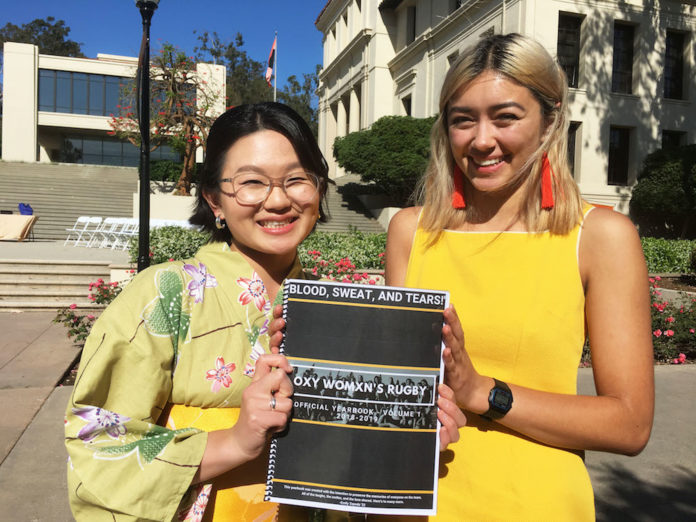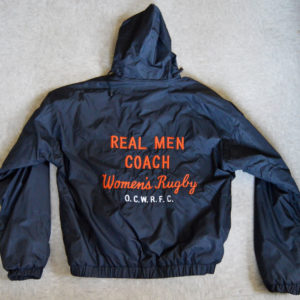
Last spring, Hope Fowler (senior) went to Special Collections hoping to find old documents and photos to archive the history of the Occidental womxn’s rugby team.
She found one box for all women’s sports before 2000.
For professor Heather Lukes’ Critical Theory & Social Justice (CTSJ) class “Queer Los Angeles: Cruising the Archive,” Fowler was tasked with archiving something that was both queer and LA-centric. The first thing she thought of was the womxn’s rugby team.
Fowler continued her research by scanning through old copies of La Encina Yearbooks with the help of rugby teammate Emily Zepeda (sophomore). Zepeda said she noticed discrepancies in La Encina’s coverage of club sports, especially womxn’s rugby.
In April 2019, Zepeda received her pre-ordered La Encina yearbook and was excited to see photos of her team.
There were none.
“The straw that broke the camel’s back was receiving the actual yearbook but then not seeing the team, which made me snap to actually be like, ‘You know, it looks like I’m going to make a yearbook,'” Zepeda said.
Fowler’s archival project inspired Zepeda to designate herself as the team’s official “yearbooker.”
Although Fowler has been on the team since Spring 2017, she realized she had little knowledge of the team’s specific history.
“I love tradition, and I’m okay with tradition,” Fowler said. “But we should know where it comes from.”
Lukes encouraged Fowler to investigate some of the “common knowledge” about rugby. She related to Fowler’s project because she had also been an athlete on her college’s rowing team, but she was not out while in college. One year, at Lavender Graduation, Lukes noticed that many of the speakers mentioned the womxn’s rugby team.
“Others of my friends who have gone to different colleges, I asked them, ‘Why did you get into rugby?’ And it’s like, ‘Well, that’s where you meet other women,'” Lukes said. “For whatever reason, it’s become a kind of coded cultural site.”
Lukes directed Fowler toward the zine Girljock about the LGBTQIAP+ history of women’s athletics in the ’90s. It helped Fowler understand different assumptions about female athletes, such as why many are seen as tomboys even if they are feminine-presenting.
“I felt a lot of this project was reading about what I already felt but couldn’t quite have the words for,” Fowler said.
Before her research, Fowler said she assumed that the womxn’s rugby team was started by a group of bored students who one day decided to start a rugby team at Occidental. The team was originally made up of both Occidental and University of Southern California (USC) students, according to Fowler. As the team gained more players, the schools split apart and formed their own teams. Fowler met with Michael Godfree, Occidental Rugby Alumni Association (ORAA) 2017 Hall of Fame inductee, to learn about the team’s beginning April 5. He gave her a jacket he received from the inaugural womxn’s rugby team.

Godfree said he coached the first rugby team, which was still joined with USC. Fowler said there are not enough records, such as scheduling rosters or yearbook photos, to verify that. She had difficulty finding the Occidental team’s official start date. She would find one photo in the yearbook from ’88, but then the team would not appear again until ’97.
“You can’t assume why you were there or weren’t there. You don’t know the sociopolitical or whatever that was going on at the time,” Fowler said. “I think that [Zepeda’s] motivation for starting the yearbook was that we might not have access to the yearbook otherwise.”
It started with a group chat. Zepeda added everyone on the team, except for the seniors. The yearbook was supposed to be a surprise for them. Womxn’s rugby Vice President Kitty Lu (junior) said she was curious at first about how Zepeda was going to execute an entire yearbook to give to the seniors before they graduated.
Lu said it was not difficult to keep the yearbook a secret from the four seniors on the team: Hannah Fishbein* ’19, Yumi Kobayashi ’19, Megan Chandramouli ’19 and Hannah Schoenberger ’19.
“The seniors were so busy trying to become adults that we really only saw them at practice and it was easy to focus on rugby and not blow the surprise,” Lu said via email.
Zepeda had about a month to pull everything together.
She grabbed photos from Facebook, Instagram and the team’s shared Google Drive. She even found photos from when some of the seniors first joined the team.
Zepeda had no previous experience in layout design or yearbook. Using the program Canva, she edited and compiled all the photos into a 30-page yearbook in between studying for finals. She called it her own personal project.
“By the action of looking just at a photograph, I’m able to much better recall that moment, and what that moment meant to me and what it felt like during that moment,” Zepeda said.
She printed out physical copies of the yearbook for the seniors at the color printer in the Academic Commons. For $3 each, she had them bound into a book at DOCS. Zepeda sent PDFs of the yearbook to the other team members. She forgot to print out a copy for herself.
Chandramouli was surprised when Zepeda gave her the yearbook because they had already finished all of their end-of-the-year rugby traditions.
“I love the yearbook as a whole, seeing my first-year moments and friends and my senior moments and friends. The yearbook reminds me how much being a part of the womxn’s rugby team shaped my time at Oxy,” Chandramouli said via email.
Chandramouli was impressed by the effort Zepeda put into the yearbook and hopes the tradition continues, but acknowledged that it may be too much for Zepeda to do every year on her own.
Zepeda is already working on this year’s yearbook, again on her own by choice. She plans to expand the book from 30 pages to 60, and include senior superlatives. Zepeda said she feels pressured to be more innovative now that the team is expecting a yearbook, but she will continue making the yearbook every year until she graduates out of love for the team and the sport.
Zepeda dropped off two copies of the yearbook to be added to Special Collections Oct. 7. In the eight years that she has been with the college, Assistant College Archivist and Metadata Specialist Anne Mar said she has not seen another sports team create their own yearbook. Looking through the archives, many sports teams, especially football, used to have team scrapbooks filled with newspaper clippings and game memorabilia.
Mar hopes more students think to add their club’s documents to Special Collections. She said they will accept anything that represents their club, from posters to photos to stickers. Students can also send links to social media posts for their online archive on Archive-It.
For Mar, reaching out to students to help document their college experience is one of her top priorities.
“This is your archive. This is your history,” Mar said. “Without [student life records], we only have the records of the administration and the faculty. It leaves out probably the biggest portion of college history with students.”
In Lukes’ class, students’ archival projects push against the idea that archives uphold the status quo by deciding what is worthy of preserving.
“Within queer theory, the concept of archiving, in a broad sense is being able to access histories that the dominant culture is not interested in saving, becomes a site of empowerment,” Lukes said. “Taking up one’s own history is an act of empowerment.”
*Fishbein is a former culture editor for The Occidental.
![]()






























